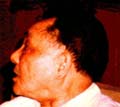Commentary/E M S Namboodiripad
What Deng could do in China need not happen in other countries
 I met
Chinese leader Deng Xiaoping,
who passed away in Beijing on February 18, four times. The
first time I met him was as a representative of the undivided
Communist Party in 1956. The Chinese party chairman then was Mao Zedong,
the prime minister Zhou-en Lai. Deng was fourth in the party hierarchy.
I heard him speak at the eighth congress of the Communist
Party. I couldn't speak to him on that occasion.
I met
Chinese leader Deng Xiaoping,
who passed away in Beijing on February 18, four times. The
first time I met him was as a representative of the undivided
Communist Party in 1956. The Chinese party chairman then was Mao Zedong,
the prime minister Zhou-en Lai. Deng was fourth in the party hierarchy.
I heard him speak at the eighth congress of the Communist
Party. I couldn't speak to him on that occasion.
Our second meeting
was in 1960 at Moscow, where Deng sharply criticised Nikita Khrushchev's
policies. I finally got a chance to speak to Deng at our third meeting.
He discussed the financial policies he had introduced in China. He
was highly critical of the financial policies prevalent not only
in China but also in Russia. His main stress then was on the multinational
attempt to defeat the socialist movement. Deng had been successful
in containing this move and giving more control to a governing system
with participation of the people. The help of capitalist countries
was needed to implement socialism in China.
Deng was aware that
when he sought the help of capitalist countries the economic system
would also be capitalist. But Deng was not digressing from the socialist
pattern of Lenin who taught us the need to seek the help of capitalist
forces. It was in 1978 that Deng shaped the policy of befriending
capitalist countries. He talked to me about this when I met
him a fourth time.
We visited several parts of China to understand
the impact of this policy. Our visit helped us understand that
the policy was working well. I must give full credit to Deng for
introducing this modern concept which brought prosperity to China.
A question that arises at this stage is whether Deng's initiatives
were not capitalist in its basic concept. The same question was also
posed to Lenin. Lenin suggested exclusion of the capitalist elements
in order to make the socialist movement work. China is a backward
country. Help from outside is essential for its growth. But Deng
saw to it that the capitalist elements did not hinder the labour
system. Everything that was implemented in China was done
under labour's control.
However, a minority in China tried to bring in
a capitalist system. The Tiananmen incidents were part of this
movement. I would like to point out that the socialist movement is
still in the state of an experiment. Errors are possible on the
way to the ultimate goal. Deng could correct these errors. What
Deng could in China need not happen in other countries. Basically,
the policies will have to correspond to the needs of each region.
In China there is a strong party and government capable
of correcting errors and driving the country onto the path of
socialism. I think India also can do this. There is no need for
repeating what China has done. Depending on the circumstances
in the country we can make our own policies and have our own
socialist movement.
Tell us what you think of this column
|



 I met
Chinese leader Deng Xiaoping,
who passed away in Beijing on February 18, four times. The
first time I met him was as a representative of the undivided
Communist Party in 1956. The Chinese party chairman then was Mao Zedong,
the prime minister Zhou-en Lai. Deng was fourth in the party hierarchy.
I heard him speak at the eighth congress of the Communist
Party. I couldn't speak to him on that occasion.
I met
Chinese leader Deng Xiaoping,
who passed away in Beijing on February 18, four times. The
first time I met him was as a representative of the undivided
Communist Party in 1956. The Chinese party chairman then was Mao Zedong,
the prime minister Zhou-en Lai. Deng was fourth in the party hierarchy.
I heard him speak at the eighth congress of the Communist
Party. I couldn't speak to him on that occasion.